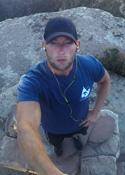Profiles of Americans with Disabilities at EPA: Westley Foster
Profiles of Members of Americans with Disabilities at EPA
 Westley Foster, EPA Tribal Coordinator
Westley Foster, EPA Tribal Coordinator
EPA Tribal Coordinator/Project Officer
Indian General Assistance Program
EPA Region 10
Seattle, Washington
(P) (206) 553-1604
Where were you born?
I was born in Puyallup, Washington.
What is your highest level of education? What was your major?
I graduated from the University of Washington with a major in Political Science and a minor in Latin American Studies.
What brought you to EPA?
After an internship with the EPA’s Office of Environmental Information (OEI) in Washington, D.C. in 2005, I changed my focus from working in the Department of Homeland Security toward working at EPA. The culture of EPA had won me over, and I appreciated the challenge of growing my knowledge and experience in the areas of human health and the environment. My work with Tribes and the Hispanic Community while in OEI were highlights of my internship and reasons for my return to EPA after graduation.
What kind of work do you do at EPA?
I am a Tribal Coordinator in EPA’s Region 10. The Tribal Coordinator role is two-fold, with the first role is as a Tribal Liaison (and direct contact between Tribes and EPA) and the second as a Project Officer for grants under the Indian General Assistance Program (IGAP). As a Tribal Liaison, we work with Tribal Governments to help increase the awareness and influence Tribes have in the processes/endeavors that the Agency undertakes. For example, Tribal Consultation is one of the times that we as Tribal Liaisons can help ensure that Tribes have the power of influence at the beginning of the process instead of at the end. As a Project Officer, we manage the technical side of IGAP grants that are aimed at providing Tribes with the assistance to build the capacity to protect human health and the environment in their communities. I also recently completed a second term as the National Vice-Chair for the EPA’s Hispanic Employment Program. I was nominated into this role by my peers in 2009.
What message would you like to send to young Americans with disabilities considering going to college or a career in environmental protection?
My message would be one of the importance of self-belief. In your endeavors, you will always find adversity in terms of negative stereotypes of people with disabilities, but it’s on us as people with disabilities to define ourselves through our work instead of allowing ourselves to be defined by the unfortunate, but all too often present judgment of ignorance. Sometimes our paths may be harder than that of people without disabilities, but we shouldn’t be deterred, discouraged, or complain about it, yet instead fight to instill the value of our community as a contributing force within the workforce and educational institutions. Remember, there will always be a line at the door of any given opportunity, but it’s going to first come down to who you define yourself as a person that’s going to allow you to be competitive. Always believe you’re the best fit for the opportunity because you work the hardest to be!
